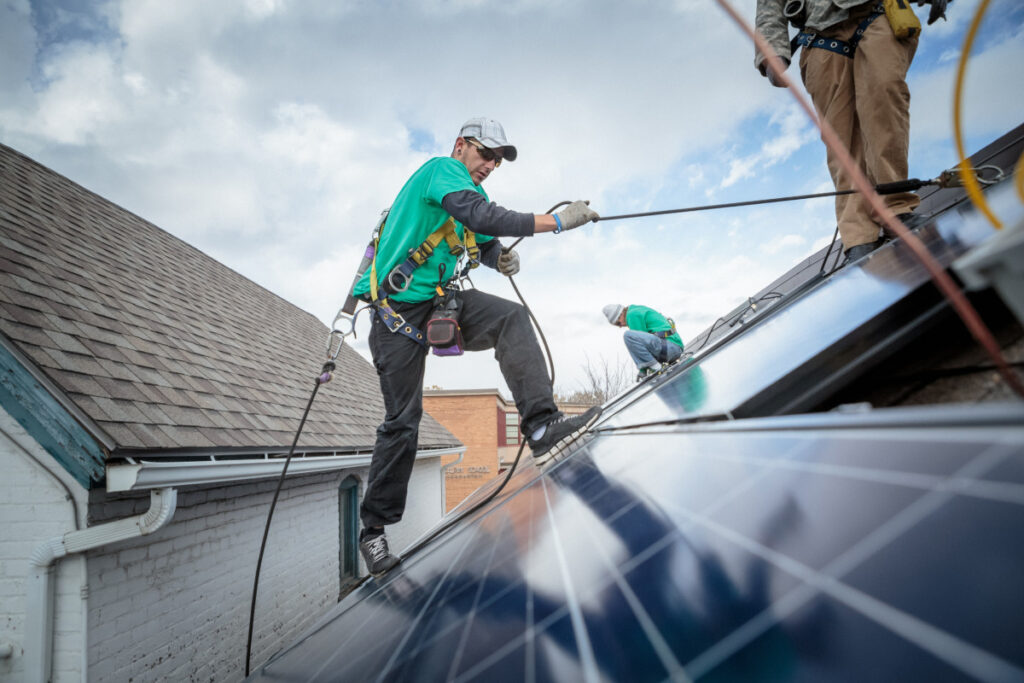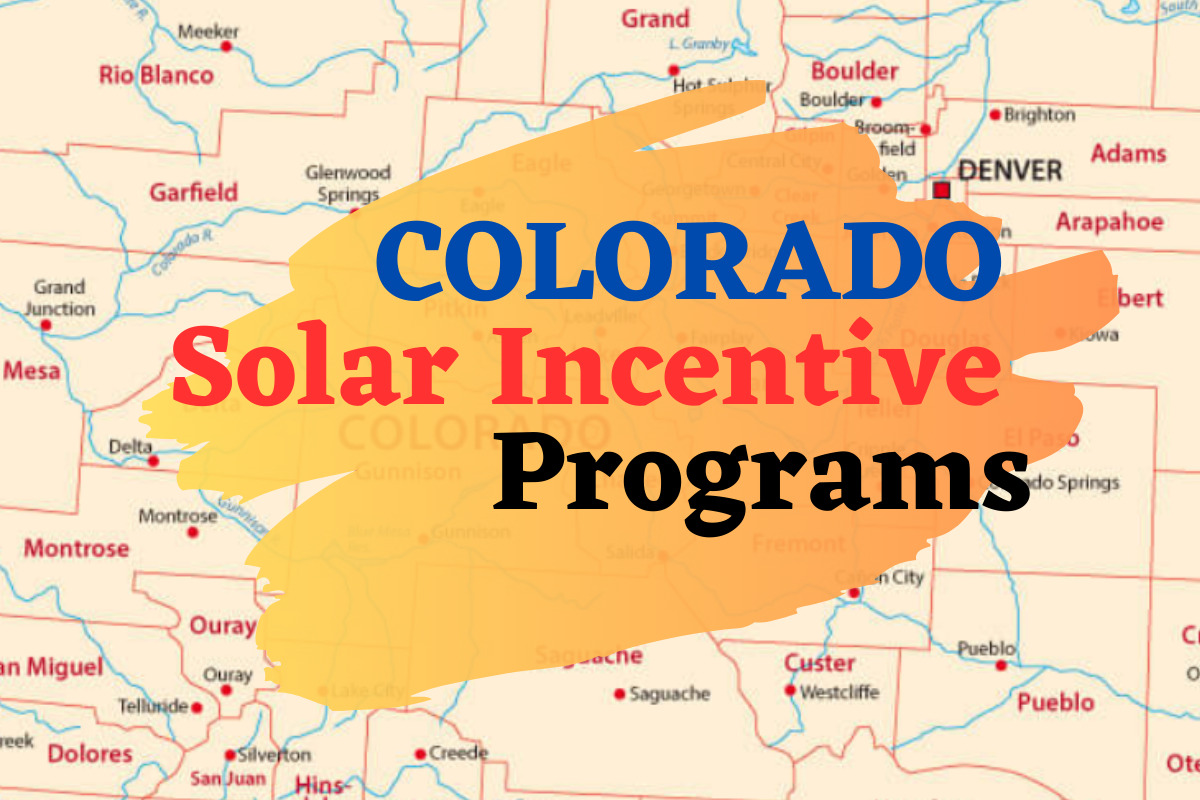Introduction
Colorado is quickly becoming a solar powerhouse, offering numerous incentives and programs to make going solar more accessible and affordable for its residents. This blog will explore the Colorado solar incentives available to homeowners, businesses, and non-profit organizations.
Understanding these incentives and opportunities in detail allows you to maximize your savings while contributing to a greener future.
Overview Of Colorado Solar Incentives
Going solar has never been more appealing, with various incentives and benefits up for grabs. There are many ways to slash expenses and switch to clean, renewable energy. So why wait? Start your solar journey today and reap the rewards! This blog post will provide an overview of Colorado’s solar incentives for homeowners, businesses, non-profits, and government entities. Whether for residential or commercial purposes in Colorado Springs or Pitkin and counties, our guide can help you utilize the state’s eco-friendly incentives for solar installation.
Federal Investment Tax Credit (ITC)
Federal Tax Credit is a major incentive for solar adoption. It reduces expenses by 30% of installation costs.
For example, if you spend $20,000 installing a residential solar power system, your eligible tax credits would amount to $6,000 ($20,000*30%). However, it’s essential to note that this rate will decrease over time – from 26% in 2033 to 22% by 2034.
As a result, property owners considering investing in solar panels should act sooner rather than later to take full advantage of these federal solar incentives before they change.
State Rebates
Colorado also offers state rebates for those who install solar panels. These rebates can vary depending on where you live and the type of solar system you purchase. For example, Xcel Energy offers a rebate program called Solar*Rewards in some regions of the state. This incentivizes residential and commercial solar installations with cash-back credits.
Additionally, some local utilities offer their own programs for solar incentives in Colorado. It’s important to research which programs are available in your area and any eligibility requirements or application deadlines that may apply.
Net Metering
Net metering is a key incentive for homeowners and businesses in Colorado looking to switch to solar power. Earn credits on your electric bill by sending excess solar energy back to the grid.
Use credits to reduce electricity costs when solar panels aren’t producing enough energy, like at night.
Colorado allows net metering for solar systems up to 120% of average consumption. Excess energy generates credit.
Renewable Energy Credits
Renewable Energy Credits (RECs) incentivize solar investment by representing clean energy generation. They can be sold to offset carbon.
Essentially, RECs allow solar owners to earn money by selling the environmental benefits associated with their solar production. In Colorado, RECs can be sold separately from the physical electricity produced by your solar panels. This allows you to maximize your financial benefit from going green.
Property Tax Exemption
One of the most significant benefits of going solar in Colorado is the property tax exemption offered by the state. Property owners who install renewable energy systems, including solar panels, are exempt from paying increased property taxes due to these installations.
For example, a homeowner who installs a 5-kilowatt solar system could save up to $1,000 per year on their property taxes. Additionally, Colorado offers a state sales and use tax exemption for renewable energy equipment purchases.
Solar power offers lower utility bills and tax exemptions. These will make you enjoy financial savings.
Solar Access Rights
Solar Access Rights let homeowners generate electricity, reduce their carbon footprint and save on utility bills. In Colorado, solar access rights allow unrestricted installation of solar panels on properties, even with potential shade. Additionally, properties with unobstructed sunlight are more valuable, with better AC electricity access from solar installations.
Renewable Energy Standard
Colorado’s Renewable Energy Standard (RES) requires utilities to generate a certain percentage of their electricity from renewable sources like wind and solar. This standard is currently set at 30%. By 2050, Colorado’s largest utility company must derive 30% of its energy production from clean, renewable sources.
This is great news for property owners interested in going solar because there will be more demand for renewable energy systems and, therefore, more incentives and programs available to support the transition.

Eligibility For Colorado Solar Incentives
Homeowners, businesses, non-profits, and government entities are all eligible for Colorado solar incentives, with varying requirements and conditions.
Homeowners
If you’re a homeowner in Colorado, there are plenty of reasons to consider going solar. Not only can a solar installation save you money on your energy bills, but numerous incentives are also available to help offset the cost.
For example, local utilities in Colorado offer cash-back credits for solar installations, and the state offers rebates and tax credits for homeowners who choose to go green with renewable energy.
Additionally, many communities around Colorado have municipal or geographic incentives that can make installing a solar panel system on your property even more affordable.
Businesses
Businesses in Colorado can also benefit from solar incentives, saving energy and costs. Commercial properties such as office buildings, warehouses, and retail spaces are eligible for federal tax credits and state rebates on solar installations.
Additionally, businesses can take advantage of net metering policies, which allow them to receive credit for excess solar power generated onsite that is fed back into the grid.
Numerous Colorado companies have switched to solar, including Walmart, IKEA, and Whole Foods Market. These companies have seen significant savings on their energy bills while helping reduce greenhouse gas emissions.
Non-profits And Government Entities
Non-profit organizations and government entities in Colorado are also eligible for solar incentives. These entities can benefit from tax credits, rebates, and other incentives to help offset the cost of installing a solar energy system.
For instance, non-profits can take advantage of the Federal Investment Tax Credit (ITC) which provides up to 30% credit on their tax liability for installation costs of an eligible solar panel system.
Additionally, renewable energy credits enable these organizations to sell excess power back to the grid while reducing their overall utility bill.
Government entities like schools or municipalities can also participate in community solar programs, allowing them to go solar without installing solar panels directly on their buildings.

Maximizing Savings With Colorado Solar Incentives
To maximize savings with Colorado solar incentives, it’s important to choose a reputable solar installer, meet eligibility requirements, research and compare solar providers, be aware of deadlines and application processes, consider financing options, utilize energy efficiency measures, and monitor energy usage and savings.
Choosing A Reputable Solar Installer
Choosing the right solar installer is critical to ensuring a successful and cost-effective solar panel installation. Here are some tips for finding a reputable solar installer in Colorado:
- Check for certifications: Look for installers who have certifications from recognized organizations such as the North American Board of Certified Energy Practitioners (NABCEP). This ensures the installer has undergone rigorous training and meets high industry standards.
- Read reviews: Research and look for past customer reviews. This can give you an idea of their professionalism, quality of work, and customer service.
- Ask about the experience: Ask the installer about their level of experience with solar panel installations, particularly in your local area. An experienced installer is more likely to handle any challenges during the installation process.
- Compare quotes: Compare quotes from multiple installers carefully. Don’t simply go for the lowest bidder; consider their reputation, experience, warranties, and equipment quality.
- Check for insurance: They have liability insurance to protect you if something goes wrong during the installation.
By taking these steps, you can find a reputable solar installer who will provide a high-quality installation that will last for many years while maximizing your savings through Colorado’s various incentives and rebates.
Meeting Eligibility Requirements
Before applying for any Colorado solar incentives, property owners must ensure that they meet eligibility requirements. Here are some key factors to consider:
- Property ownership: To be eligible for solar incentives in Colorado, the property owner must legally own the property where the solar energy system will be installed.
- Site suitability: The property must have adequate sunlight exposure and a suitable roof or ground area for installing solar panels.
- Energy use: Property owners should evaluate their current energy usage, and future needs to determine whether solar power is viable and future needs to determine whether solar power is a viable option for them.
- Building codes and permits: Compliance with local building codes and obtaining necessary permits are essential before installing solar systems in Colorado.
- System specifications: Solar systems must meet certain technical specifications, as Colorado’s Renewable Energy Standard requires.
Meeting these eligibility requirements can help property owners maximize their savings through various incentives and tax credits available in Colorado.
Researching And Comparing Solar Providers
When exploring solar providers, it’s important to research and compares different options to make an informed decision. Here are some tips to help you with the process:
- Look for reputable solar companies with good reviews and ratings in your area.
- Check if the company offers a free consultation or quote to assess your needs.
- Compare multiple solar providers’ pricing, warranties, and equipment offerings.
- Consider the experience and qualifications of the solar installers.
- Look into any financing options or payment plans the company offers.
- Ask for references from past customers to gauge their satisfaction with the installation process and customer service.
Remember that choosing a reputable solar company can impact the success and longevity of your solar energy system. By carefully researching and comparing various providers, you can ensure you get the best value for your investment while contributing to a more sustainable future for Colorado’s communities.
Being Aware Of Deadlines And Application Processes
If you want to take advantage of the solar incentives available in Colorado, it’s important to be aware of deadlines and application processes. Here are some tips to help you stay on top of things:
- Start early: Going solar can take some time, so starting early is a good idea. Research the requirements and eligibility criteria for the different incentives and prepare your documents accordingly.
- Check deadlines: Many incentives have specific deadlines for application submission, so make sure you know these dates well in advance. Mark them on your calendar or set a reminder on your phone to ensure you don’t miss out.
- Follow instructions carefully: Each incentive program may require different documents or have specific submission formatting rules. Ensure you read and follow the instructions carefully to avoid any delays or rejection of your application.
- Keep copies of all documentation: It’s always a good practice to keep copies of all documents submitted as part of the incentive applications. This can help you avoid any discrepancies or issues that may arise later in case clarification is needed.
- Contact support if needed: If you’re having trouble with any aspect of the application process, reach out to relevant support teams for assistance. They can guide you through the process and ensure your application is processed smoothly.
By staying on top of deadlines and following guidelines carefully, you can maximize the benefits from Colorado’s solar incentives programs for property owners while enjoying clean energy at an affordable cost while also contributing towards reducing the carbon footprint in Colorado communities.
Considering Financing Options
If you’re a property owner in Colorado looking to install solar panels, financing options can make your project more affordable. Here are some options to consider:
- Solar loans: These are specifically designed for solar panel installations. They usually have lower interest rates and longer repayment periods than traditional loans.
- Home equity loans: If you have equity in your home, you may be able to take out a home equity loan to finance your solar panel installation.
- Power purchase agreements (PPAs): Some solar companies offer PPAs, where they install and maintain the panels on your property, and you pay a monthly fee for the energy generated.
- Leasing options: Similar to PPAs, leasing allows you to rent solar panels and pay a monthly fee for their use.
- Property-assessed clean energy (PACE) financing: This option allows you to finance your solar panels through a special assessment of your property taxes.
No matter which financing option you choose, it’s important to research and compare rates and terms from multiple providers. Also, remember that some incentive programs may require specific financing options for eligibility.
Fun fact: Colorado was ranked in the top ten states with the most installed megawatts of solar capacity as of 2021!
Utilizing Energy Efficiency Measures
One way to maximize savings with Colorado solar incentives is by utilizing energy efficiency measures on your property. Here are some ways to do it:
- Upgrade Insulation: Adding insulation to your home or business can improve energy efficiency and reduce heating and cooling costs.
- Install ENERGY STAR appliances: Replacing outdated appliances with more efficient models can significantly reduce energy consumption.
- Use LED lighting: Switching to LED light bulbs can save up to 80% on lighting costs.
- Reduce water usage: Fixing leaks, upgrading to low-flow showerheads, and using drought-resistant landscaping can all help reduce water usage and lower utility bills.
- Implement smart technology: Smart thermostats, programmable lights, and automated systems can help optimize energy use and save money over time.
By implementing these measures alongside installing a solar energy system, property owners in Colorado can greatly reduce their carbon footprint while maximizing savings on their electricity bills.
Monitoring Energy Usage And Savings
As a property owner going solar in Colorado, monitoring your energy usage and savings is important. Here are some tips for doing so:
- Install a monitoring system: A solar monitoring system can help you track your energy production and usage. Many solar companies offer this service, and it can be accessed through a smartphone app or online portal.
- Check your utility bills: Your monthly utility bill will show you how much energy you are using and how much you are paying for it. Monitor your bill to see if your solar panels produce enough energy to offset your usage.
- Monitor weather patterns: Weather can impact the energy your solar panels produce. Keep track of any weather changes to understand how they impact your energy usage.
- Analyze data regularly: Reviewing your monitoring data regularly can help you identify any issues with your solar panel system or changes in energy usage patterns. This information can help you make adjustments as needed to maximize savings.
- Consider software options: Several software options allow you to track and analyze data for multiple properties or locations at once. These programs can help streamline the monitoring process and provide valuable insights into energy efficiency.
By monitoring your energy usage and savings, you can make informed decisions about optimizing your solar power system and save money on electricity costs over time.
Next Steps For Going Solar In Colorado
After researching and selecting the right solar equipment and financing options, homeowners should hire a reputable professional solar installer to guide them through the application processes for tax incentives and rebates in Colorado.
Filing For Tax Incentives And Rebates
Property owners need to file for tax incentives and rebates to take advantage of Colorado’s solar incentives. Here are some steps to follow:
- Determine eligibility: Check the requirements for each incentive or rebate program to ensure that you qualify before filing an application.
- Gather documentation: You’ll need supporting documents such as proof of ownership, permits, and receipts for equipment purchases and installations.
- Apply for incentives: File applications for federal tax credits, state rebates, and other available incentives with the necessary agencies.
- Claim on taxes: Make sure to claim your solar tax credits each year on your federal income taxes.
- Verify receipt of incentives: Follow up with the relevant agencies or utilities to confirm that your application has been received and processed correctly.
By taking these steps, property owners can make the most of the solar incentives available in Colorado. Doing so will save money while contributing to a cleaner energy future.
Exploring Solar Rebate And Program Options
If you’re a property owner in Colorado interested in going solar, there are many rebate and program options to explore. Here are some things to consider:
- Research local utilities: Many Colorado utilities offer cash-back credits for solar installations. Check with your utility provider to see if they offer any incentives.
- State Rebates: Colorado offers solar rebates and incentives for homeowners that can help offset upfront costs. Check with the state government’s Energy Office to see what rebates you may qualify for.
- Renewable Energy Credits: Colorado offers renewable energy credits for solar installations to help offset the cost of going solar.
- Municipal Incentives: Colorado Municipalities offer geographic solar installation incentives, including grants or tax exemptions.
- Xcel Energy Solar Rewards Program: Xcel Energy, one of the largest utilities in Colorado, offers a Solar Rewards Program that provides incentives to customers who install solar energy systems on their homes or businesses.
- Free Solar Program: If you meet specific income requirements, Colorado offers a free solar program allowing low-income families to go solar at no cost.
By exploring these rebate and program options, property owners in Colorado can take advantage of the many benefits of going solar while saving money along the way.
Choosing The Right Solar Equipment
When choosing the right solar equipment, many options are available in Colorado. Here are some tips for making the best decision for your property:
- Consider your energy needs: Assessing how much electricity you use and when can help determine the size and type of solar system you need.
- Determine your budget: Get quotes from multiple solar companies and compare pricing, financing options, and warranties.
- Research equipment brands: Look for reliable and reputable brands with a proven quality and performance track record.
- Choose between photovoltaic or concentrated technology: Photovoltaic (PV) panels are most commonly used for residential installations, while Concentrated Solar Power (CSP) systems are used primarily for utility-scale projects.
- Check out efficiency ratings: The higher the efficiency rating of a solar panel, the less space you’ll need on your roof to achieve your desired energy output.
- Think about aesthetics: Solar panels come in different colors, sizes, and designs that can make them blend well visually with your property.
Considering these factors when choosing solar equipment, you can be confident that you’re investing in a high-quality system that will provide clean energy benefits for years.
Hiring A Professional Solar Installer
If you’re considering going solar in Colorado, hiring a professional solar installer is critical to ensure that your renewable energy system is installed correctly and efficiently. Here are some things to keep in mind when hiring a solar installer:
- Research solar installers in your area before making a decision. Look for companies with experience installing residential or commercial solar systems.
- Verify the company’s credentials and certifications. Working with a licensed and insured contractor who follows established industry standards is essential.
- Check customer reviews and testimonials online. Look for installers with positive feedback from satisfied customers.
- Request a detailed proposal or estimate from at least three solar companies. Compare pricing, equipment, warranties, and installation timelines before deciding.
- Ask the installer about the warranty on their workmanship and equipment guarantees offered by manufacturers.
- Review financing options available through the installer or other resources.
Working with an experienced, professional solar installer can help ensure that your renewable energy investment is booming and hassle-free and provides you with the benefits of clean energy for years to come.
Enjoying The Benefits Of Clean, Renewable Energy
Property owners can experience the numerous benefits of clean, renewable energy by going solar in Colorado. Not only will you reduce your carbon footprint and contribute to a more sustainable future, but you’ll also enjoy significant savings on your monthly energy bills.
With the help of state rebates and tax incentives, colorado communities can transition to renewable energy at an affordable price point. Property owners who install solar panels often see increased home values and positive impacts on their local environment.
Conclusion
Going solar in Colorado is a wise investment for property owners. With state and federal incentives, net metering policies, and renewable energy standards, it’s one of the most supportive states for solar power.
Property owners can maximize their savings while enjoying the benefits of clean energy by choosing a reputable solar installer, meeting eligibility requirements, and researching financing options.
FAQs:
- What incentives are available for solar installations in Colorado?
Colorado offers a variety of incentives to encourage the adoption of solar energy, including income and property tax credits, sales tax exemptions on solar equipment purchases, and rebates from utilities or other organizations that offset the installation cost.
- How can I determine eligibility for Colorado’s solar incentives?
The eligibility requirements vary by program but generally depend upon factors such as your location within the state, the size and type of your solar system, and whether you’re a homeowner or business owner. You can research specific programs online or consult an experienced installer to help you determine which programs suit your needs.
- Are there any limits to how much money I can save through Colorado’s solar incentives?
Many incentive programs have caps on how much money they will provide per installation or year. Savings potential varies based on individual circumstances, such as energy usage. Furthermore, additional fees like permitting costs may be associated. That’s why it is essential to perform proper calculations before settling on financing options.
- Are there any deadlines for applying for Colorado’s solar incentives?
Some incentive programs have limited funds available each year – so early application is highly recommended! Some credits expire after two years, while others remain open until funding runs dry. This also depends upon government regulations & updates in timelines over time.]When considering investing in a new Solar Energy System, keep yourself updated about these changes!



